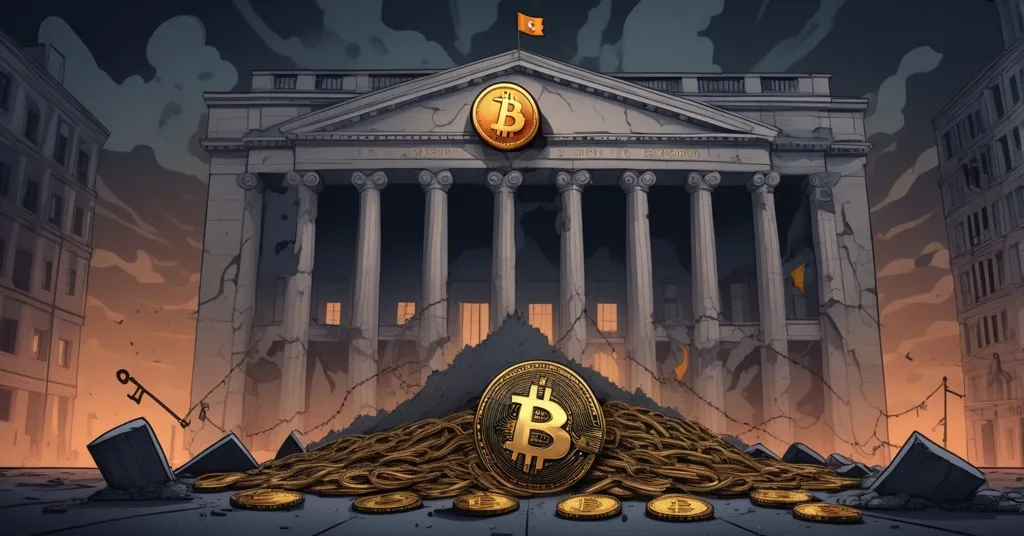$45M Bitcoin Donation Scandal Rocks Czech Politics Ahead of Elections

$45 Million Bitcoin Scandal Sparks Political Chaos in Czech Republic
A jaw-dropping $45 million Bitcoin donation from a convicted criminal has ignited a full-blown political crisis in the Czech Republic, exposing glaring flaws in governance and thrusting cryptocurrency into a harsh spotlight. This bizarre saga, blending digital assets with public corruption, has led to resignations, a failed no-confidence vote, and renewed global scrutiny over how decentralized tech intersects with power.
- Convicted criminal Tomáš Jiřikovský donates 470 BTC ($45 million) to the Ministry of Justice on May 27.
- Ministry sells the Bitcoin immediately without law enforcement oversight, triggering outrage.
- Justice Minister resigns, no-confidence vote fails by seven votes, and political trust crumbles ahead of October elections.
The Donation: A Criminal’s Gambit or a Dirty Trick?
On May 27, Tomáš Jiřikovský, a notorious figure convicted of drug trafficking, weapons offenses, and embezzlement, transferred roughly 470 Bitcoin—valued at approximately $45 million or 1 billion CZK—to the Czech Ministry of Justice. For the uninitiated, Bitcoin is a decentralized digital currency built on a blockchain, a secure, tamper-proof ledger that records transactions without a central authority like a bank or government. Jiřikovský’s donation, a fraction of his illicit crypto hoard, was spun by some as an act of restitution. But let’s not kid ourselves—when a darknet market operator tied to platforms like Nucleus Market hands over millions in digital assets, the stench of ulterior motives is hard to ignore.
Digging deeper into Jiřikovský’s background reveals a career criminal who amassed wealth through illicit online marketplaces. Beyond the donated 470 BTC, which stemmed from a 1,561 BTC wallet returned to him via a court ruling, he reportedly controls an additional 3,855 BTC from his darknet dealings. However, tech expert Jiří Berger points out much of this larger stash remains inaccessible due to outdated systems—think lost private keys or obsolete wallet software that lock funds away in digital limbo. Could more tainted Bitcoin surface later? It’s a lingering question that amplifies the scandal’s scope. The Ministry’s decision to liquidate the donation almost immediately, without involving law enforcement or following transparent protocols, only fuels suspicion. Was this a genuine act of penance, as some claim, or a slick attempt to launder dirty crypto through public channels? The lack of clarity is damning, and more details on Jiřikovský’s controversial donation paint an even murkier picture.
Political Fallout: Resignations, Votes, and Raw Anger
The repercussions hit like a freight train. By May 30, Justice Minister Pavel Blažek, already a controversial figure nicknamed “Don Pablo” for past scandals involving pressuring judges and cozying up to questionable lobbyists, resigned under intense scrutiny. Allegations surfaced that he had prior knowledge of the donation, a claim that shredded any remaining trust in his leadership. Blažek defended the transaction as “ultra-legal” and even suggested Jiřikovský’s move was a form of “penance.”
Accepting millions in crypto from a darknet kingpin without a shred of transparency isn’t just incompetent—it’s either willful negligence or something far uglier.
Let’s call a spade a spade: this reeks of rot at the highest level. Reports also point to Finance Minister Zbyněk Stanjura facing pressure to step down over alleged awareness of the deal, adding another layer of governmental accountability—or lack thereof—to this mess.
The opposition, a coalition of parties including ANO, SPD, and the Pirates, seized the moment, launching a no-confidence motion against Prime Minister Petr Fiala’s government on June 18. After a grueling 24-hour parliamentary debate, marked by heated accusations and personal attacks, the motion fell short with 94 votes, missing the required 101 by a narrow margin. Fiala, head of the Civic Democratic Party, slammed the opposition’s tactics as “dirt-throwing” and “lies,” particularly their social media smear campaigns. Yet he couldn’t dodge the damage, admitting the incident has:
[Shook] public confidence.
With parliamentary elections looming in October, and polls showing ANO under populist Andrej Babiš leading with 31.2% support compared to Fiala’s coalition at 21.6%, the timing couldn’t be worse. Babiš didn’t mince words, branding Fiala’s party a “criminal organization” and the Prime Minister himself “the head of the mafia.” While that’s likely political theater, it reflects a raw, simmering anger among voters. This isn’t just a one-off blunder—it’s the fourth no-confidence vote against Fiala’s government in three years, following crises over energy, inflation, and even spying allegations. The Bitcoin scandal is merely the latest crack in a crumbling wall of public trust, with updates on Fiala’s no-confidence vote shedding light on the political stakes.
Stepping into the chaos is Eva Decroix, sworn in as the new Justice Minister on June 10 by President Petr Pavel. She’s pledged to deliver:
Transparency and clear answers.
Decroix has promised an independent probe into the donation and its handling. But with trust already in tatters, can a single investigation rebuild faith in a system that seems allergic to accountability? Only time will tell. For a broader perspective, the $45 million Bitcoin scandal is seen by many as a power grab opportunity for opposition forces.
Bitcoin in Politics: A Double-Edged Sword
Zooming out, this debacle isn’t just a Czech problem—it’s a glaring symptom of a global struggle between cryptocurrency’s promise and its perils when tangled with political power. Bitcoin’s decentralized nature is its greatest strength, a middle finger to corrupt intermediaries and a tool for financial sovereignty—principles we fiercely champion as advocates of disruption and effective accelerationism. But without guardrails, it’s also a magnet for abuse. The Czech scandal echoes similar missteps worldwide, revealing a pattern of systemic failure when digital assets meet public office.
- In Argentina, President Javier Milei’s endorsement of the dubious Libra token preceded a $99 million “rug pull”—a scam where developers abandon a project and vanish with investors’ funds—leaving countless burned and ethics in question.
- In the U.S., figures like Donald Trump have faced heat for profiting off crypto ventures amid murky ethical boundaries, raising red flags about conflicts of interest.
- Even in South Korea, government crackdowns on exchanges over lax anti-money laundering controls highlight how ill-prepared many nations are to handle decentralized finance’s risks.
These cases scream a harsh truth: digital assets in the hands of public officials, without rigorous oversight, are a recipe for fiasco. The Czech Ministry’s fumble also underscores a practical challenge—Bitcoin’s volatility. Slight discrepancies in the reported value of Jiřikovský’s donation ($45 million vs. €40 million in some outlets) stem from BTC’s price fluctuating hourly due to market dynamics. If the Ministry sold during a dip, did they lose potential value? Hypothetically, a 5% price swing on 470 BTC at that scale could mean millions left on the table. Governments aren’t just grappling with ethics; they’re wrestling with basic competence in managing such assets. The global comparison of cryptocurrency political scandals offers further insight into these recurring issues.
Lessons for Bitcoin’s Future: Maximalism Meets Reality
For Bitcoin maximalists like many of us, this stings. We see BTC as the ultimate bastion of freedom, a way to dismantle fiat fraud and centralized control. But when governments botch its integration—or worse, exploit it—adoption takes a brutal hit. It’s not just optics; there’s a real fear of regulatory overreach. If scandals like this pile up, expect knee-jerk laws that choke innovation rather than curb corruption. Altcoins and other blockchains, like Ethereum, often fill niches Bitcoin doesn’t—think smart contracts, self-executing agreements coded on a blockchain that automate processes without middlemen. Yet they’re not immune to similar misuse, especially since features like traceability can be weaponized by bad actors or clueless officials alike.
The Czech scandal is a cautionary tale for the entire crypto community. How can Bitcoin remain a symbol of liberty if governments keep turning it into a punchline for incompetence? We must push for frameworks that preserve decentralization while slamming the door on blatant corruption. Transparency in public handling of crypto isn’t negotiable—think mandatory blockchain audits or third-party oversight for any governmental transactions involving digital assets. Without such measures, every step toward mainstream acceptance risks being derailed by clowns in suits who can’t tell a wallet from a black market. For a deeper dive into this mess, check out the comprehensive overview of the Czech Bitcoin scandal.
With elections on the horizon, the stakes for Fiala’s coalition are sky-high. Will Decroix’s investigation unearth damning truths, or will it be a whitewash? Can trust be salvaged when millions in criminal crypto change hands without accountability? And what does this mean for Bitcoin’s image as a force for good? Community reactions on platforms like Reddit regarding the Czech political crisis show just how divided opinions are. Let’s unpack the key questions and takeaways on everyone’s mind:
- What triggered the no-confidence vote against Petr Fiala’s government?
The vote was sparked by a $45 million Bitcoin donation from convicted criminal Tomáš Jiřikovský to the Ministry of Justice, compounded by the Ministry’s immediate, shady sale of the assets without law enforcement oversight. - Why did Justice Minister Pavel Blažek resign so swiftly?
Blažek stepped down on May 30 amid allegations of knowing about the donation in advance, fueling accusations of corruption or negligence at the highest level. - How does this scandal reflect broader cryptocurrency challenges in politics?
It mirrors global cases like Argentina’s Libra token rug pull and U.S. crypto profiteering, spotlighting the urgent need for regulatory clarity to stop decentralized assets from becoming tools of political malfeasance. - Could this impact the Czech elections in October?
Undoubtedly—polls show opposition party ANO leading, and this debacle could further erode faith in Fiala’s coalition, potentially reshaping the political landscape. - What’s the critical takeaway for Bitcoin advocates?
While Bitcoin embodies freedom and disruption, incidents like this demand we fight for transparent integration into public systems to prevent corruption from tainting its revolutionary potential.
The Czech Republic’s Bitcoin scandal isn’t just a political melodrama; it’s a stark wake-up call. Cryptocurrency holds the power to redefine finance and challenge outdated power structures, but only if we confront the harsh realities head-on. As champions of decentralization, we must celebrate Bitcoin’s strengths while ruthlessly calling out those who twist it for personal or political gain. No excuses, no sugarcoating—just the unvarnished truth. With millions in play and trust hanging by a thread, the world is watching how this unfolds, and we’d be fools not to pay attention. For those seeking deeper academic perspectives, the impact of cryptocurrency scandals on politics offers valuable research resources.



